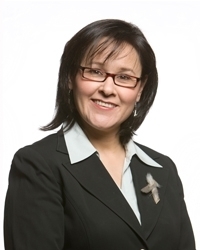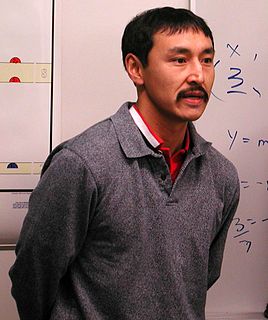
The Northwest Territories general election, 2003 was the 20th general election in the Canadian territory's history, conducted on November 24, 2003, to elect the 19 members of the Legislative Assembly.
The Executive Council of Nunavut or cabinet includes a Premier and seven Ministers and is elected by the members of the Legislative Assembly from among the Assembly members.
The Nunavut general election, 1999 was the first general election in the territory and was held on 15 February 1999, to elect the members of the 1st Legislative Assembly of Nunavut.

Same-sex marriage is legal in Nunavut. The territory began granting marriage licences to same-sex couples upon the passage of the federal Civil Marriage Act on July 20, 2005. Previously, beginning in October 2003, same-sex marriages performed in other jurisdictions were legally recognized in Nunavut.
Jack Iyerak Anawak is a Canadian politician. He represented the electoral district of Nunatsiaq in the House of Commons of Canada from 1988 to 1997. He sat in the house as a member of the Liberal Party of Canada. Following his retirement from federal politics, he also served a term in the Legislative Assembly of Nunavut after that territory was created in 1999. He ran as the New Democratic Party's candidate for his old riding, now renamed Nunavut, in the 2015 election, but was defeated by Liberal candidate Hunter Tootoo.
Tagak Curley is an Inuit leader, politician and businessman from Nunavut. As a prominent figure in the negotiations that led to the creation of Nunavut, Tagak is considered a living father of confederation in Canada. He was born in a hunting camp at Coral Harbour, Northwest Territories.
Iqaluit West was a territorial electoral district (riding) for the Legislative Assembly of Nunavut, Canada.

Leona Aglukkaq, is a Canadian politician. She was a member of the non-partisan Legislative Assembly of Nunavut representing the riding of Nattilik from 2004 until stepping down in 2008; then was a Conservative member of the House of Commons of Canada representing the riding of Nunavut after winning the seat in the 2008 federal election. She was the first Conservative to win the seat, and only the second centre-right candidate ever to win it. She remained MP until she was defeated in the 2015 federal election by Liberal candidate Hunter Tootoo. Aglukkaq is the Conservative candidate for the 2019 federal election.
James Arreak is a territorial and municipal level politician in Canada. He has served as a member of both the Nunavut and Northwest Territories legislatures.
This article provides a timeline of elections in Canada, including all the provincial, territorial and federal elections. The information starts from when each province was formed or entered the Confederation, and continues through to the present day.
Elisapee Sheutiapik is a Canadian politician, who served as mayor of Iqaluit, Nunavut, from 2003 to 2010, and was elected to the Legislative Assembly of Nunavut in the 2017 general election.
The Third Nunavut General Election took place on October 27, 2008, to return members to the 3rd Legislative Assembly of Nunavut. The election was contested across 15 of Nunavut's 19 electoral districts under the first past the post system of voting. Due to local circumstances, the election was delayed in two districts, and two districts did not hold elections as their incumbent MLAs faced no opposition and were acclaimed back into office.

Eva Qamaniq Aariak is a Canadian Inuk politician, who was elected in the 2008 territorial election to represent the electoral district of Iqaluit East in the Legislative Assembly of Nunavut. She was subsequently chosen as the second Premier of Nunavut, under the territory's consensus government system, on November 14, 2008. Aariak was the fifth woman to serve as a premier in Canada.

Peter Taptuna is a Canadian politician who served as the third Premier of Nunavut from 2013 to 2017.
The 3rd Legislative Assembly of Nunavut began after the 2008 general election on October 27, 2008. The election returned 17 of the 19 non-partisan members with two deferred for other days. The last member returned in the general election in the Akulliq district on March 2, 2009.
Samuel Nuqingaq is a Canadian politician, who was elected to the Legislative Assembly of Nunavut in the 2013 election. He was expelled from the legislature in 2014.

The Nunavut general election, 2017 was held in the Canadian territory of Nunavut on October 30, 2017 to return the members of the 5th Nunavut Legislature. The fifth general election held since the creation of the territory in 1999, it was the first election held under Nunavut's new fixed election dates law, which requires elections to be held no more than four years after the prior election.









